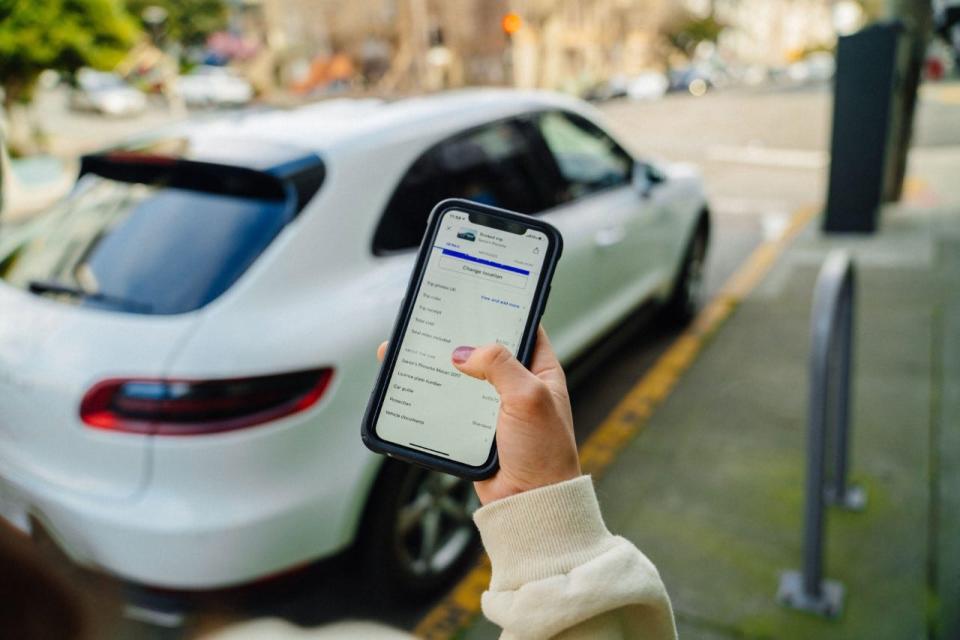Car sharing apps like Turo are growing. Now, the rental industry is pushing back.
- Oops!Something went wrong.Please try again later.
There's a new State House political debate over short-term rental websites and apps — and this time it revolves around cars.
Lobbyists for Turo, the self-described "world’s largest car sharing marketplace," are trying to stop legislation introduced by Senate President Dominick Ruggerio they say would put limits not seen elsewhere in the country on people's ability to make money off their personal vehicles.
Turo and other "peer-to-peer car sharing" sites are kind of like Airbnb for cars. Or they're like Uber, but you're the driver.
Until recently, these vehicle rental sites have not generated anywhere near the attention of Airbnb, which some blame for exacerbating the housing crisis.
Short-term rentals: Hotel lobby wants RI lawmakers to allow cities, towns to control, or ban, short-term rentals

What would the legislation do?
The car-sharing legislation in question, Senate Bill 1 and a House version introduced by Rep. Arthur Corvese, D-North Providence, would only change things for people who post more than five vehicles per year on a car sharing website.
Senate spokesman Greg Pare describes the bill as a "clean up" of the law passed last year that officially recognized "peer-to-peer car sharing" and set out rules for it.
It would delete a section of the law that says the new peer-to-peer rules trump any statute they may conflict with.
And it would add new language saying that vehicles rented over peer-to-peer platforms will not legally be considered rental cars as long as their owner "does not share more than five vehicles through one or more peer-to-peer car sharing programs in one calendar year."
That's significant, because bonafide "rentals" are subject to a different set of regulations and an 8% surcharge on transactions, plus the state sales tax.
Real estate market: $400K is the new median selling price of houses in RI. What does it actually buy?

Who supports the bill?
The "clean up" bill is backed by car rental company Enterprise and Jina Petrarca, whose family owns North American Auto Leasing as well as Providence Auto Body. Both Enterprise and Providence Auto Body are reliable donors to the campaigns of leading General Assembly Democrats.
"Many other states have had these develop into rental companies being operated off a peer-to-peer platform," Petrarca told the Senate Judiciary Committee. "So we are concerned with taxation, because we are taxed, and also also consumer protections. For example, rental companies can't rent a salvage vehicle."
She added that while some people use sites like Turo to make a few dollars off their personal vehicle when they aren't using it, the site also advertises itself as way for entrepreneurs to make a good income by renting out a fleet of vehicles.
Turo's site says its "hosts," the Airbnb-like term it uses for vehicle owners, can make on average $10,516 a year renting out a single vehicle, $52,579 per year renting out five vehicles and $94,642 renting out nine vehicles.
Ruggerio did not testify in support of the bill.
Steve Ranieri of Enterprise told the Senate Judiciary Committee that without having to pay the 8% surcharge, peer-to-peer hosts can undercut traditional car rental agencies on bread-and-butter markets like airport rentals.
"We want a fair playing field," Ranieri said. "These other companies, I am not sure what they do ... I do not know if they are remitting taxes on that."
Turo argues their market is 'completely different' from traditional rentals
But Robert Jacquard, the former state representative lobbying for Turo along with former senator Stephen Alves, said the market served by peer-to-peer vehicle sites is completely different from the market for traditional rental companies, often involving short periods of time or specialty vehicles.
"There is no state in the country that imposes any kind of arbitrary limit on how many cars a person can put on sharing apps," Jacquard told The Journal last week. "The market should decide whether people are better off creating a rental car company or being in the car sharing industry."
Jacquard said what the rental car companies are keeping quiet is that, unlike residents using sharing apps, rental agencies do not have to pay sales tax when they buy vehicles in bulk. And while car rental companies collect the 8% surcharge, they are allowed to use some of it to pay for DMV fees and other expenses.
"Instead of enacting this unnecessary and unfair restriction on peer-to-peer car sharing, Turo encourages the committee to consider a much more pressing priority: ending the rental car industry's flagrant exploitation of a loophole whereby traditional rental car companies are able to dodge paying any sales tax to the State of Rhode Island on the purchase of their fleet vehicles," Pablo Benevente, Turo's senior political and government relations manager, wrote to the Judiciary Committee.
The Senate Judiciary Committee passed Ruggerio's bill unanimously last week and it is slated for a vote in the full Senate when the General Assembly returns from spring break on Tuesday, April 18.
The House Corporations Committee has not yet scheduled a hearing on Corvese's version of the bill.
This article originally appeared on The Providence Journal: Turo, car sharing apps growing in RI, but rental companies pushing back

